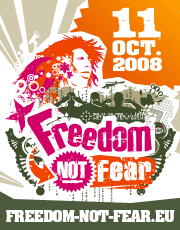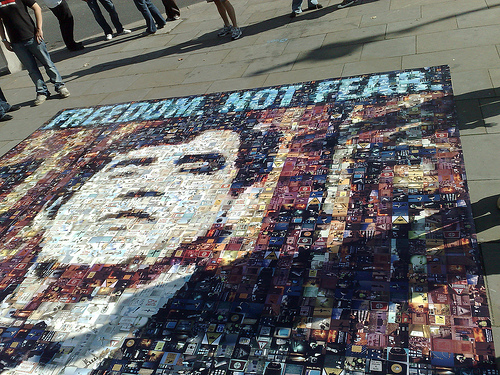
Why should we care about it?
Surveillance and data retention is a problem that deserves Global attention, even for developing countries. In developing countries protests for such causes are sometimes not among the list of priorities, such as poverty, hunger and violence, which are the major concerns. Not quite. In Peru [1], breaking news points to surveillance coming from the government, and recently in Guatemala, the President himself was under heavy surveillance [1].
Mass surveillance is threatening the fabric of a democratic and open society and a healthy Internet. Mass surveillance is also endangering the work and commitment of civil society organizations – on and offline. That is why many conscious people got together last Saturday to commemorate Freedom not Fear Day [2], with a variety of peaceful protests:
In Berlin the greatest protest march against surveillance in Germany's history took place: Participants in the 2 km long, peaceful protest march carried signs reading “You are Germany, you are a suspect”, “No Stasi 2.0 – Constitution applicable here”, “Fear of Freedom?” and “Glass citizens, brittle democracy”. Apart from related music tracks, loud chants of “Belittle it today, be under surveillance tomorrow” or “We are here and we are loud because they are stealing our data” could be heard. During the protests, which were supported by more than 100 civil liberties groups, professional associations, unions, political parties and other organisations [3], artists played parodies on surveillance society.
It all started with the opposition to a Data Retention directive in EU [4]. Now it has evolved and become global, as expressed by the Electronic Frontier Foundation (EFF) [5]:
Freedom Not Fear has evolved into a more general warning: showing how fundamental freedoms like privacy, freedom of expression, and democratic participation lose when reactionary surveillance systems penetrate our open networks, justified by a hyperbolic rhetoric of fear.
Saturday was a day to express why freedom, democracy, free speech, the right to private spaces and the right to private communication are important for any open society, and why mass-surveillance, mass data storage, mass data retention and video-surveillance by governments and private corporations are undermining such important liberties. The Internet is not immune for such invasion, actually, it has become a “tool” enabling many governments to control. The main argument has been Security concerns, but as explained by expert Bruce Schneir [6] on his blog [7]:
Too many wrongly characterize the debate as “security versus privacy.” The real choice is liberty versus control. Tyranny, whether it arises under threat of foreign physical attack or under constant domestic authoritative scrutiny, is still tyranny. Liberty requires security without intrusion, security plus privacy. Widespread police surveillance is the very definition of a police state. And that's why we should champion privacy even when we have nothing to hide.
Events took place in more than a dozen countries around the World [8], and hopefully in the years to come more voices will join to act against such abuses from Governments and companies.
From a big picture (above) unveiled by Open Rights Group in London [9], to a meeting of up to 100,000 people in Berlin, activities in Argentina [10], articles in Chile, an informative talk in Guatemala [11], and a rally followed by a Statement for October 11, 2008 [12] in U.S., many people joined efforts to express their opposition to the increasing surveillance and controls by governments and also against data retention.
The most important messages were to affirm international human rights, including freedom of expression and privacy protection, repeal legal authorities that permit warrantless surveillance [13], unconstitutional monitoring and tracking of individuals, and a call to end the culture of secrecy that allows government officials to hide mismanagement, fraud, and incompetence behind the veil of “homeland security”, i.e. a call to transparency.
As GNS Blog [14] said:
Computer technology, with its ability to store masses of data and then mine it for patterns of behaviour, or reproduce it to the unauthorised, or just monitor people's everyday activity, has a huge potential for ill in the hands of repressive or technologically illiterate governments. Equally it has huge potential for empowerment, the enablement of free speech and social networking
Here you can watch this illustrative video [15] on Youtube:
